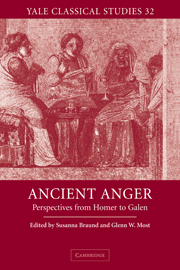Book contents
- Frontmatter
- Contents
- Notes on contributors
- Acknowledgments
- List of abbreviations
- Introduction
- Chapter 1 Ethics, ethology, terminology: Iliadic anger and the cross-cultural study of emotion
- Chapter 2 Anger and pity in Homer's Iliad
- Chapter 3 Angry bees, wasps, and jurors: the symbolic politics of ὀργή in Athens
- Chapter 4 Aristotle on anger and the emotions: the strategies of status
- Chapter 5 The rage of women
- Chapter 6 Thumos as masculine ideal and social pathology in ancient Greek magical spells
- Chapter 7 Anger and gender in Chariton's Chaereas and Callirhoe
- Chapter 8 “Your mother nursed you with bile”: anger in babies and small children
- Chapter 9 Reactive and objective attitudes: anger in Virgil's Aeneid and Hellenistic philosophy
- Chapter 10 The angry poet and the angry gods: problems of theodicy in Lucan's epic of defeat
- Chapter 11 An ABC of epic ira: anger, beasts, and cannibalism
- References
- Index of passages cited
- Index of proper names
- Index of topics
Introduction
Published online by Cambridge University Press: 22 September 2009
- Frontmatter
- Contents
- Notes on contributors
- Acknowledgments
- List of abbreviations
- Introduction
- Chapter 1 Ethics, ethology, terminology: Iliadic anger and the cross-cultural study of emotion
- Chapter 2 Anger and pity in Homer's Iliad
- Chapter 3 Angry bees, wasps, and jurors: the symbolic politics of ὀργή in Athens
- Chapter 4 Aristotle on anger and the emotions: the strategies of status
- Chapter 5 The rage of women
- Chapter 6 Thumos as masculine ideal and social pathology in ancient Greek magical spells
- Chapter 7 Anger and gender in Chariton's Chaereas and Callirhoe
- Chapter 8 “Your mother nursed you with bile”: anger in babies and small children
- Chapter 9 Reactive and objective attitudes: anger in Virgil's Aeneid and Hellenistic philosophy
- Chapter 10 The angry poet and the angry gods: problems of theodicy in Lucan's epic of defeat
- Chapter 11 An ABC of epic ira: anger, beasts, and cannibalism
- References
- Index of passages cited
- Index of proper names
- Index of topics
Summary
These days, the emotions are hot stuff. No doubt they always have been, and in more ways than one. For, however often and drastically they interfere with our thinking, the fact remains that the emotions are good tools for thought – not only for thought about the similarities and differences between humans and animals, but even more for reflection upon the similarities and differences between humans and humans. Attributing to other human beings the same kinds of emotional states as those we attribute to ourselves is one of the fundamental strategies in all attempts at understanding across the gulfs that separate one culture from another, one age from another, one person from another. Astonishingly, such attempts seem often to succeed; but the questions of why they do, and how they fail, have provided conundra for anthropology, hermeneutics, historical studies, lexicography, and a host of other disciplines. For at first glance emotions may well seem universal, and indispensable to anything we would wish to count as being human, and it is certain that in the end we cannot do without them as an explanatory category in our dealings with other humans and their works; yet by the same token it does not take much reflection or experience to see that what has been understood as an emotion and what has been thought proper to do with it, in private and in public, vary and have varied widely across all possible sets of parameters.
- Type
- Chapter
- Information
- Ancient AngerPerspectives from Homer to Galen, pp. 1 - 10Publisher: Cambridge University PressPrint publication year: 2004
- 1
- Cited by

